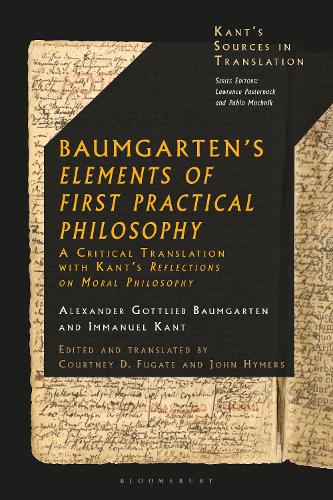
Baumgarten's Elements of First Practical Philosophy: A Critical Translation with Kant's Reflections on Moral Philosophy
(Hardback)
Available Formats
Publishing Details
Baumgarten's Elements of First Practical Philosophy: A Critical Translation with Kant's Reflections on Moral Philosophy
By (Author) Alexander Gottlieb Baumgarten
By (author) Immanuel Kant
Translated by Courtney D. Fugate
Translated by John Hymers
Edited by Courtney D. Fugate
Edited by John Hymers
Bloomsbury Publishing PLC
Bloomsbury Academic
28th May 2020
United Kingdom
Classifications
Tertiary Education
Non Fiction
Ethics and moral philosophy
170
Physical Properties
Hardback
392
Width 162mm, Height 238mm, Spine 36mm
780g
Description
This book presents the first English translation of Alexander Baumgartens Initia Philosophiae Practicae Primae, the textbook Kant used in his lectures on moral philosophy. Originally published in Latin in 1760, the Initia contains a systematic, but original version of the universal practical philosophy first articulated by Christian Wolff. In his personal copy, Kant penned hundreds of pages of notes and sketches that document his relation to this earlier tradition. Translating these extensive elucidations into English, together with Kants notes on the text, this translation offers a complete resource to Kants reading of the Initia. To facilitate further study, first-time translations of elucidatory passages from G. F. Meier and Wolff are also included, alongside a German-English-Latin glossary. The translators introduction provides a biography of Baumgarten, a discussion of the importance of the Initia, its relation to Wolffs and Meiers universal practical philosophy and its role in Kants lectures. By shedding new light on the arguments of Kants mature works and offering insights into his pre-Critical moral thought, Elements of First Practical Philosophy reveals why Baumgarten's work is essential for understanding the background to Kants philosophy.
Reviews
By providing a translation of Alexander Baumgarten`s Elements of First Practical Philosophy, together with the translation of the complete set of marginal notes or jottings concerning that work, which are contained in Kant`s Nachlass, Fugate and Hymers have rendered an invaluable service to Anglophone students of Kant`s moral philosophy. Their importance stems from the fact Kant used this work as one of the textbooks for his lectures on ethics, which he delivered with regularity throughout his academic career. Moreover, these lectures, together with the notes, constitute the main sources for understanding the development of his moral philosophy. * Henry E. Allison, Professor Emeritus of Philosophy, UC San Diego and Boston University, USA *
Baumgartens Initia is the most important source for understanding both Kants lectures on ethics and the development of his moral philosophy as a whole. This careful, annotated translation of the Initia, along with Kants handwritten reflections on it, is indispensable for students and scholars of Kants ethics writing in English, and useful to any who read English. * Patrick Kain, Associate Professor of Philosophy, Purdue University, USA *
This magnificent volume will add a whole new dimension to English-language Kant scholarship. No one with a serious interest in Kants practical philosophy can afford to ignore it. * Jens Timmermann, Professor of Moral Philosophy, The University of St Andrews, UK *
Author Bio
Alexander Baumgarten (1714 - 1762) was among the first to teach the controversial philosophy of Christian Wolff (1769-1764). By order of the king, he moved to Frankfurt on the Order in 1739, where he remained until his death in 1762. His most influential philosophical works are Metaphysics (1739), Philosophical Ethics (1740), and Aesthetics (2 Vols, 1750 & 1757). It is as formulated in these works that the Leibniz-Wolff tradition was chiefly communicated to later German philosophers, including Immanuel Kant. Today Baumgarten is also regarded as a central founder of modern aesthetics. John Hymers is Associate Professor of Philosophy at La Salle University, USA. Courtney D. Fugate is Associate Professor at the American University of Beirut, Lebanon.
